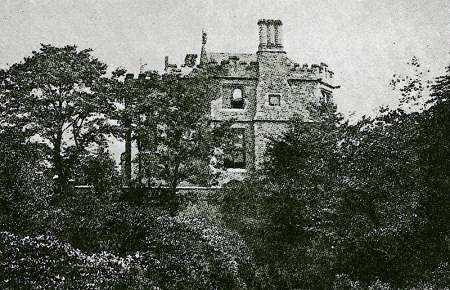Castle Irwell, Castle Irwell Lane, Pendleton
Castle Irwell was built in 1826 by John FitzGerald, who, through his wife, had inherited a vast estate in the district of Pendleton. There was a popular belief that Irwell Castle was built on an ancient castle site, as it occupied a pretty, wooded knoll by the river Irwell called Hylewood; but no signs of antiquity were found when, about 1900, it and the knoll were demolished to make a level horse racing course. Given that John FitzGerald was one of the wealthiest landowners in Great Britain, Castle Irwell, with a mere six bedrooms, was a surprisingly modest property. The first description appeared in 1835 when it was advertised to let as follows:
To be let furnished or unfurnished, Castle Irwell, beautifully situated on very elevated ground, with the pleasure grounds tastefully laid out, and planted with thriving evergreens etc. The house consists of dining, drawing, and breakfast rooms, six bedrooms, water closet, etc, and all well-cellared under and replete with every requisite fixture; together with a superior four-stalled stable, most excellent double coach house, good court-yard, walled round, and a cottage for a servant, with every other convenience. The above premises are well adapted for the residence of a genteel family, the situation being one of the most-healthy in the neighbourhood of Manchester. For tickets of admission apply to Mr Goldsmith, architect, 19 Bond Street, Manchester. [Manchester Guardian 17 October 1835 page 1]
The house was again offered for rent within weeks of John FitzGerald’s bankruptcy in January 1849 and again in November 1850-April 1851. At the same time other properties on the Pendleton estates were also offered for rent including a villa situate near the New Hall Farm in Pendleton, and the Suspension Bridge Brewery.
CASTLE IRWELL: TO BE LET, with immediate possession, and a part of the furniture may be taken at a valuation if required. This delightful residence is situated near the river Irwell at Pendleton. and about 2.25 miles from Manchester, containing hall, dining and drawing rooms, library, six bedrooms, dressing rooms, two kitchens, cellars. and other offices; together with four-stalled stables, coach-house, cottage, gardens, pleasure grounds, etc. The whole premises are in excellent state of repair—apply to Mr HUGH HIGS0N, Pendleton Colliery. [Manchester Guardian 11 December 1850 page 1], [Manchester Guardian 27 November 1850 page 1], [24 December 1850 page1], [30 November 1850 page 2]
In 1861 Habershon and Pite, architect, 38, Bloomsbury Square, London were employed by John Purcell Fitzgerald to provide a scheme for alterations and additions for which tenders were sought in August of that year. No contemporary description of these works has been found although it is believed that these included the extension at the north-west corner in the form of a three-storey crenelated “Pele tower,” containing a saloon on the ground floor and four additional bedrooms above. The house was offered for rent in 1868 when it was described as follows:
CASTLE IRWELL: TO BE LET and may be entered upon immediately. This house is situated at Pendleton, about three miles from Manchester, and may be let for one year ready furnished, consisting of large saloon, dining, drawing and breakfast rooms, and with every other accommodation for a large respectable family; together with cottages for gardener and coachman, coach house, stables, glass houses, gardens, grounds etc. For further particulars apply to Mr Hugh Higson, Lower Broughton. {Manchester Guardian 23 April 1868 page 2]
By 1873, further improvements included a vinery and hot-house:
TO BE LET, furnished for one year, or unfurnished for a term of five or seven years, all that capital mansion house with stables, outbuildings, menservant’s cottages, gardens and pleasure grounds, with vinery and hot-house thereunto belonging, known as Castle Irwell, Broughton (sic) the property of J F G Purcell FitzGerald Esq. It contains three reception rooms, library, ten bedrooms, kitchen, servants’ hall, with all other needful offices, and is supplied with water and gas. To treat and for an order to view apply to Messrs Bridgford and Sons, Estate Office, Gerald Road, Pendleton, or 30 Cross Street, Manchester. [Manchester Guardian 24 May 1873 page 2]
John FitzGerald, of 39, Portland Place, London; of Boulge Hall, Woodbridge; of Naseby; of Little Island, Waterford; and of Castle Irwell. was a man of more enterprise than business, and sat for a short time as the representative of Seaford in the unreformed House of Commons. Born John Purcell, he was the son of Dr. John Purcell, of Dublin and in 1801 married his cousin Mary Frances, the daughter and heiress of his uncle John Fitzgerald of Little Island, Waterford, who also had estates at Pendleton and Gayton, Staffordshire. She had previously been engaged to the Duke of Wellington. On the death of her father John Purcell took his wife's surname of FitzGerald. Axon noted “This marriage of near kin has been cited, with or without reason, an explanation of the eccentricity which certainly marked the family.” In the endeavour to develop his Pendleton coal mines in Whit Lane John FitzGerald became involved in serious financial difficulties. He was declared bankrupt on December 28, 1848. and his first examination, before Mr. John Evans, took place on 17 January, 1849. The liabilities were stated to be about £198,000. The sale at Bourge Hall is said to have lasted for six days, and the household goods were also dismantled at Naseby and Castle Irwell. The final meeting of the creditors was held on June 21, 1849, when no opposition was offered and the bankrupt passed. John FitzGerald died at Regent's Park Terrace, Camden Town, March 18. 1852.
Castle Irwell then became the property of his eldest son, John Purcell FitzGerald, who visited but occasionally. However, it was John Purcell FitzGerald who refused to renew the lease on the Racecourse when this expired in 1867. His youngest brother, Edward, also visited Castle Irwell in 1832 and 1835 before finding fame as the poetic translator of the beautiful Persian poem, the Rubaiyét of Omar Khayyam, in 1859.
